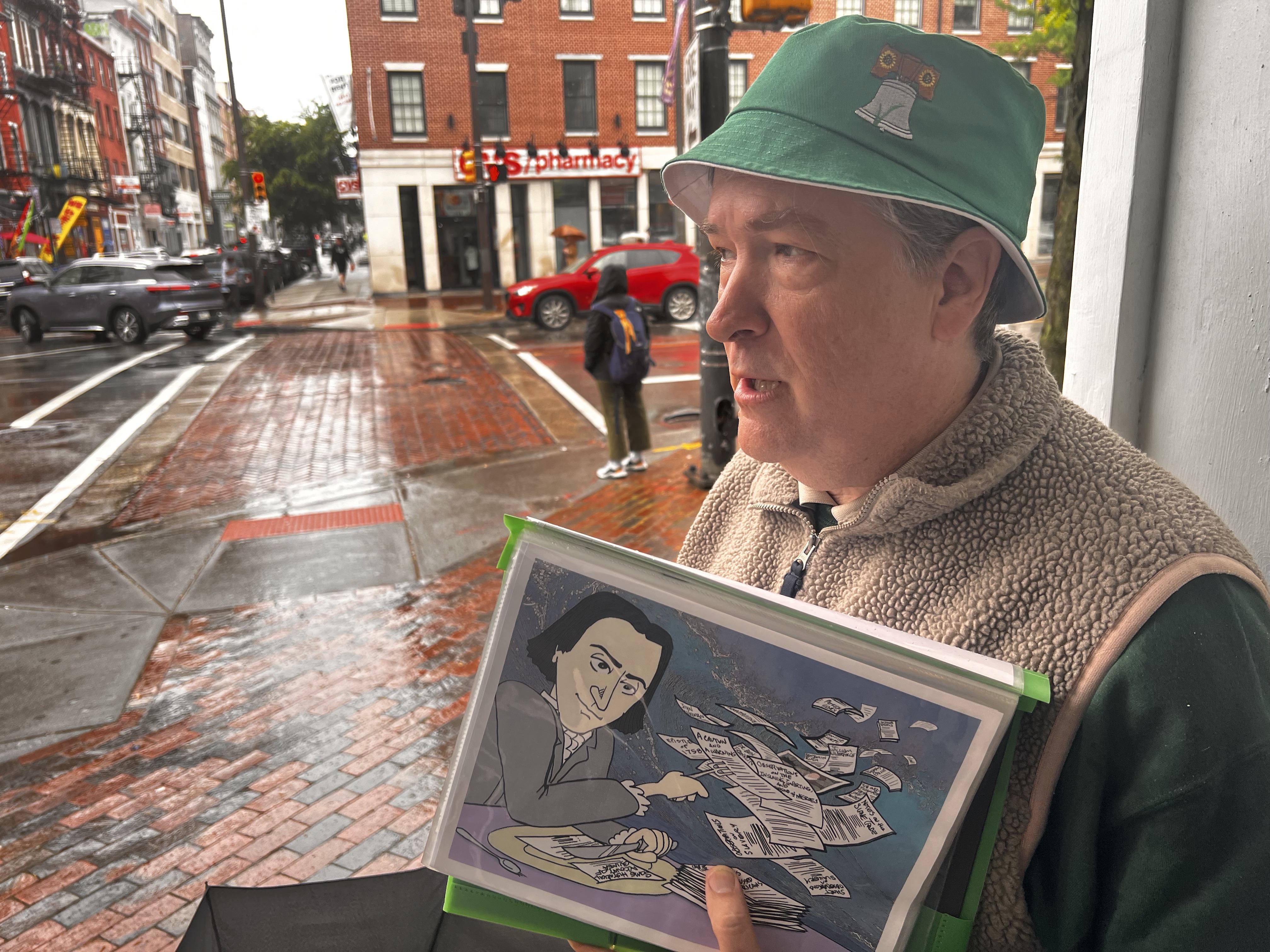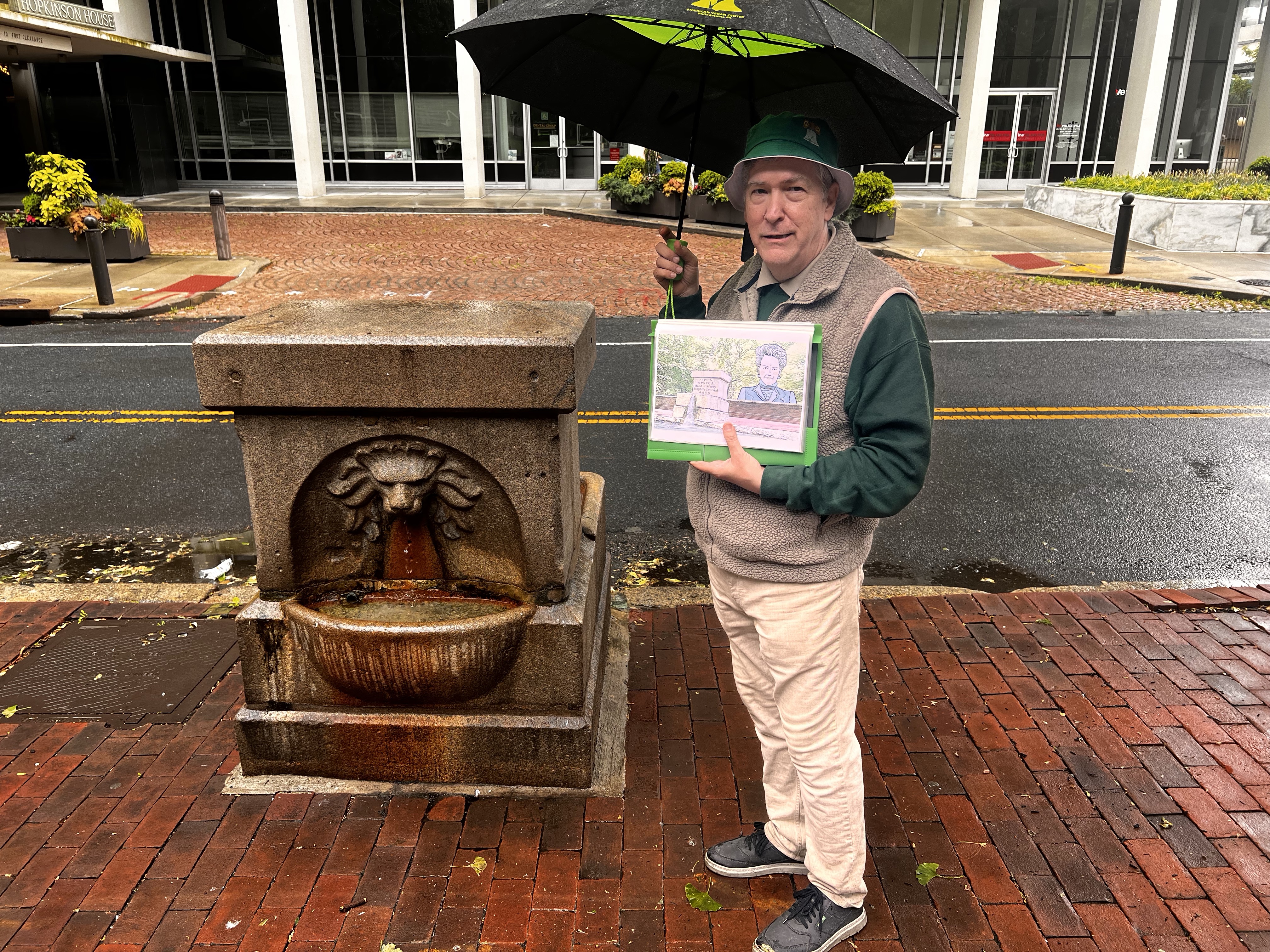Taking a walk in the rain with a vegan
Did you know there are three dozen vegan -- not vegetarian, but vegan -- restaurants in Philadelphia?
I didn’t, nor did I know that Philadelphia was an early center of American vegetarianism, and remains a center of veganism today.

Tour guide and American Vegan Center director Vance Lehmkuhl (Photo: Stu Bykofsky)
That’s among the things I learned during an 80-minute tour, mostly in a light rain, led by Vance Lehmkuhl, director of the American Vegan Center, 17 N. 2nd St., directly across the street from Christ Church. [Personal disclosure: Once upon a time, Vance was the online editor of the Philadelphia Daily News, where we were colleagues and friends, and he wrote a popular vegetarian column for the paper.]
The tour opens at 2nd & Market with an anecdote about Ben Franklin, who was an on-again, off-again vegetarian.
Lehmkuhl points to where Franklin arrived in Philadelphia, and had a vegetarian meal -- three loaves of bread. No, he didn’t intend it to be a vegetarian meal, but that was what he could afford, Lehmkuhl confesses, but the elder statesman did experiment with his diet over the years.
He was fascinated with the tofu he discovered in England, when he represented the Colonies. He found how it was grown from plants, and sent some to Philadelphian John Bartrum, a leading American botanist, but that experiment didn’t blossom.
Philly’s early vegetarians often were abolitionists, Lehmkuhl says, concerned with both human and animal welfare.
Anthony Benezet was such a man and campaigned to end slavery and to expand the idea of not eating animals.
Perhaps the most notable, and aggravating, abolitionist/vegetarian was Benjamin Lay, a hunchback, dwarf and Quaker who harangued and embarrassed the hell out of Quakers who owned or traded in slaves.
He was right, of course, but was kicked out of the Philadelphia Quaker meeting for embarrassing them. Or exposing their hypocrisy -- your choice.
In 1817, the Bible Christian sect came over from England dedicated to the idea that God did not want man to eat animals, according to the Bible. Unfortunately, the Bible had plenty to contradict that idea. But they were the launching pad for the nation’s veg movement.
There were many others mentioned by Lehmkuhl, but this isn't a history lesson. I do want to mention Caroline Earle White, a particular hero of mine for her love of animals.

White led the effort to create watering stations for animals, such as this one at Washington Square. (Photo by Stu Bykofsky)
She co-founded the Pennsylvania SPCA in 1868, but was banned from the board because she was a woman. She then opened a branch of that as an animal shelter, existing today as the Women’s Animal Center in Bensalem.
I am an animal lover, and many decades ago I swore off veal when I learned how baby calves are tortured by being held immobile and shot full of drugs so their flesh will be tender for you. Read this to learn more, if you dare.
I next quit eating pork products to protest factory farming, which is inhumane and denies these intelligent creatures the natural behaviors they crave.
We may have to kill animals to eat them, but we don’t have to torture them.
I have been bothered by the treatment of all food animals, but I hesitated taking the next step.
Today, I am taking it.
I will no longer eat the flesh of any mammal. I ban beef and sheep from my menu, along with pork and veal.
I will also replace as much chicken as I can with plant substitutes.
At the American Vegan Center, I bought a spicy jerk chicken burger. It did not taste or have the texture of chicken, but it was delicious, thanks to the spices, which originally were eschewed by vegetarians, Lehmkuhl explains. Starting in the ‘70s, they were added, and the taste improved greatly. My breakfast “wake and steak” short roll had excellent egg and cheese substitutes.
I look for fake meat or plant products at the supermarket.
What I am doing may not be enough, but it’s what I can manage now.
More later? Maybe.
Vance will understand.
-----
If you are interested in a 90-minute vegan tour, summer hours are Saturday and Sunday at 11 a.m., Saturday at 4 p.m., Sunday at 5 p.m. Tours leave from the American Vegan Center at 17 N. 2nd St. $23 per person, $12 per student, group rates available. Call 267-665-7753.



